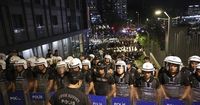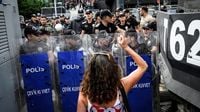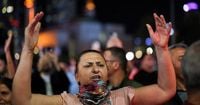In Istanbul, political tensions have reached a fever pitch as Turkish authorities imposed a sweeping three-day ban on public gatherings across several central districts, effectively blockading the provincial headquarters of the country’s largest opposition party, the Republican People’s Party (CHP). The move, which began late on Sunday, September 7, 2025, comes amid a fierce dispute over the appointment of a court-ordered trustee to lead the CHP’s Istanbul branch—a development that has sparked outrage, protests, and a digital clampdown across Turkey.
The immediate catalyst for this unrest was an Istanbul court’s decision last week to suspend the CHP’s provincial leadership, citing alleged irregularities in the party’s 2023 congress. In the same ruling, the court appointed Gursel Tekin, a former CHP lawmaker known for his alignment with the party’s old guard, as interim chair. According to Reuters, the court’s intervention was met with swift condemnation from the CHP, which denounced the move as a politically motivated attempt to undermine its growing influence in Turkish politics.
As word of the court’s decision spread, the CHP’s leadership—headed by party chairman Ozgur Ozel—called on supporters to gather at the party’s Istanbul headquarters in a show of defiance. Ozel, speaking at a party event, issued a passionate appeal: “From here, I invite all democrats and CHP members whom my words and voice reach to, to protect the home of Ataturk in Istanbul.” He continued, “Shame on those who have put our home under police siege, who brought police special forces to our Istanbul provincial headquarters... to those trying to cancel our Istanbul provincial congress via unauthorised courts and seat an appointee there.” These words, reported by Reuters, resonated with many, prompting a surge of supporters to gather outside the headquarters despite the looming ban.
The response from Istanbul’s governor’s office was swift and uncompromising. Late Sunday, authorities announced a three-day prohibition on public assemblies in the city’s central districts, specifically targeting the areas surrounding the CHP headquarters. Police erected barricades and heavily restricted access, effectively placing the building under siege. According to The Media Line, this show of force was intended to prevent a Monday rally protesting the court-ordered shake-up of the opposition’s local leadership.
Yet, the ban did little to deter determined party loyalists and democracy advocates. Starting Sunday night, crowds began to gather outside the CHP headquarters, openly defying the restrictions. The party’s youth wing had called for a demonstration at 2000 GMT on Sunday, with another planned for early Monday. The sight of police cordons and barricades did not dissuade many from voicing their opposition to what they saw as an assault on Turkey’s democratic institutions.
In a further escalation, the internet watchdog NetBlocks reported that several major social media platforms, including X (formerly Twitter), YouTube, Instagram, and WhatsApp, were restricted in Turkey shortly after the CHP’s call for rallies. This digital blackout, as highlighted by AP and The Media Line, was widely interpreted as an effort to stifle communication among protesters and limit the spread of dissenting voices.
Underlying the current confrontation is a broader campaign against the CHP that has unfolded over recent months. Authorities have intensified investigations into CHP-controlled municipalities, citing alleged corruption. The most high-profile casualty of this crackdown came in March 2025, when Istanbul Mayor Ekrem Imamoglu—widely regarded as President Recep Tayyip Erdogan’s most formidable political rival—was arrested. Imamoglu’s detention triggered the largest street protests Turkey has witnessed in over a decade, with demonstrators accusing the government of orchestrating a campaign to neutralize the opposition and erode democratic norms.
The CHP has consistently rejected all corruption allegations, asserting that the legal measures are nothing more than politicized attempts to eliminate electoral threats to Erdogan’s two-decade rule. “The legal measures are politicised attempts at eliminating electoral threats against Erdogan and weakening the opposition,” the party has maintained, according to Reuters.
For its part, the government has repeatedly insisted that the judiciary operates independently and that there is no political interference in the legal proceedings against the CHP. Interior Minister Ali Yerlikaya, addressing the controversy on X, stated, “Disregarding court rulings, trying to pour people out onto the streets is openly challenging the law. Nobody is above the laws. The state will do what is necessary against any illegal initiative with determination.” He added that the state would “never allow” public order to be disrupted, signaling a firm stance against further protests.
The standoff between the CHP and the authorities comes at a particularly sensitive time for Turkish politics. Later this month, a separate court in Ankara is expected to rule on a similar case targeting the CHP’s 2023 main congress, which resulted in the election of Ozgur Ozel as party leader. An adverse ruling could potentially reinstate the party’s former leader, Kemal Kılıcdaroglu, whose tenure was marked by both internal and external criticism. As AP notes, the outcome of this case could have far-reaching implications for the future direction of the CHP and the broader opposition movement in Turkey.
Political analysts suggest that the court’s intervention in the CHP’s affairs, coupled with the aggressive policing of protests and digital restrictions, reflects a broader pattern of democratic backsliding in Turkey. The government’s critics argue that these actions are part of a deliberate strategy to weaken the opposition ahead of future elections and consolidate power. Supporters of the government, however, maintain that the measures are necessary to uphold the rule of law and ensure public order in the face of what they describe as unlawful provocations.
The battle for control of Turkey’s most powerful opposition party is now playing out both in courtrooms and on the streets of Istanbul. With police barricades still in place, social media throttled, and the provincial leadership under a court-appointed trustee, the CHP finds itself at a crossroads. The outcome of the ongoing legal battles and the party’s ability to mobilize public support will likely shape the contours of Turkish politics for years to come.
As the city holds its breath, all eyes are on the courts and the streets, where the struggle for Turkey’s democratic future is unfolding in real time.



